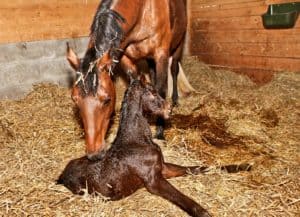
How to Predict Foaling
When will your mare foal? Learn the signs of impending foaling and what prognostic tools can help.

When will your mare foal? Learn the signs of impending foaling and what prognostic tools can help.

Best practices whether milking a mare by hand, using a commercial device, or rigging a milker out of a syringe.

Give your new foal the best chance for a healthy start to life by understanding the red flags—and the green lights—of neonatal health.

Proper nutrition is critical for growth and development. Learn the right way to feed your foal.

Orphan foals raised with a correct balance of nutrients and monitored for growth, food consumption, and weight gain can be every bit as tall, strong, and athletic as foals raised by their dams.

Be familiar with the most common problems that can happen within 24 hours of foaling.

Dr. Michelle Linton offers suggestions on how to identify when your mare is ready to foal.

University of Pennsylvania’s Dr. Michelle Linton describes the how a normal foaling should progress.

Do you have a foal due? Learn how to prepare your mare for foaling, care for your newborn, and spot issues early.

Foals with IgG levels lower than 800 mg/dL are more likely to die than those with levels greater than 800 mg/dL.

To a newborn foal, colostrum can mean the difference between life and death.

Find out why foals require passive transfer of infection-fighting antibodies from their mothers’ first milk.
The immune system allows humans and animals including horses to survive in a complex world filled with harmful bacteria and viruses that can use our bodies for nourishment and reproduce within us. The immune system protects us from those organisms
A medication protocol that can induce lactation in “open” mares has changed the way prominent Kentucky Standardbred nursery, Walnut Hall Ltd., manages its nurse mare herd, while giving more than 20 rescued mares a new
Walnut Hall’s vet, Joe
It appears most young foals born on farms with endemic Lawsonia intracellularis could be protected from equine proliferative enteropathy (EPE), a spreading intestinal disease caused by the bacterium, provided they ingest colostrum containing
Traditionally, one of the stronger parts of each AAEP convention program is the time devoted to reproduction. The convention held in Orlando was no exception. It began with an in-depth session titled “Perinatology–End of Pregnancy Through
Stay on top of the most recent Horse Health news with
© 2022 Copyright Statement dolor sit amet, consetetur sadipscing User Terms, sed diam nonumy eirmod tempor invidunt ut labore et dolore magna aliquyam erat, sed diam voluptua. At vero eos et accusam et justo duo dolores et ea rebum. Stet clita kasd gubergren, no sea takimata sanctus est Lorem ipsum dolor sit amet.
"*" indicates required fields